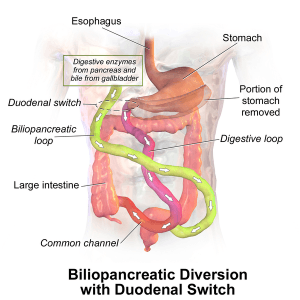A Duodenal Switch is a laparoscopic surgery where weight loss is achieved by combining two techniques: food restriction and malabsorption.
The procedure involves reducing the size of the stomach and rerouting the intestines. During the surgery, the size of the stomach is reduced by 80 percent, prompting the patient to feel satisfied sooner while eating. The smaller stomach also produces fewer “hunger-causing” hormones, including ghrelin, thus patients are tempted to eat less.
The Duodenal Switch has also proven effective in aiding Type 2 diabetics return to normal blood sugar levels due to the metabolic effects of the procedure. As Type 2 diabetes is a common co-morbidity of obesity, the Duodenal Switch is an excellent choice for some patients.
In this procedure, doctors may remove the gallbladder (as rapid weight loss following bariatric surgery can lead to the formation of gallstones). This factor, along with the repositioned intestines, causes the body to absorb fewer calories and minerals, therefore less calories are absorbed from the food that patients consume, which aids in significant weight loss. However, this feature also means that patients are required to take vitamin supplements throughout their lifetimes in order to receive the complete and healthy nutrition doctors require.
Since the first bariatric procedure was performed in 1959, specialists have learned much about what to expect during and after weight loss surgery.
At the Longstreet Clinic’s Center for Weight Management, our board certified bariatric specialists are experts in procedures such as the Duodenal Switch and will discuss this procedure with patients – along with other weight loss surgeries, such as the Gastric Bypass and the Gastric Sleeve – to see which procedure might work best for them.
We understand that the decision to undergo weight loss surgery is not to be entered lightly. We also know that, for many patients, bariatric surgery is the best option in order to gain control of their lives and get them on a healthy track.
Obesity is a dangerous disease – one with a health designation like any other disease (such as cancer) – and, for those patients with a Body Mass Index (BMI) of 40 or more, weight loss surgery, such as the Duodenal Switch, may be their only real chance for necessary, significant, and lasting, weight loss.
How Does a Duodenal Switch Work?
 The Duodenal Switch is an inpatient surgical procedure takes approximately 2 to 3 hours to complete. It begins with a Gastric Sleeve procedure in order to remove a large portion of the stomach. The stomach is divided vertically with the portion intact, shaped like a banana. The remaining portion of the stomach connects the esophagus to the top of the small intestine.
The Duodenal Switch is an inpatient surgical procedure takes approximately 2 to 3 hours to complete. It begins with a Gastric Sleeve procedure in order to remove a large portion of the stomach. The stomach is divided vertically with the portion intact, shaped like a banana. The remaining portion of the stomach connects the esophagus to the top of the small intestine.
The small intestine is then cut below the duodenum, the portion responsible for chemical digestion.
Once the top part of the small intestines is detached, the surgeon will then make a second cut to the small intestine several feet down, near the large intestine. The remaining portion of the small intestine, attached to the colon, is then connected to the duodenum, allowing the digestive juices produced to mix with the food entering from the stomach.
The objective of a Duodenal Switch is to reduce the amount of time the body has to capture calories from food in the small intestine and selectively limit its absorption of fat.
What is the Expected Recovery?
With the extent of the Duodenal Switch procedure, patients should plan to remain in the hospital for 2 to 3 days. Patients are generally able to return to work after 2 weeks and can expect a full recovery within 4 to 6 weeks, once the incisions have healed completely.
At the Center for Weight Management, our physicians will do their best to have you moving around and being safely active as fast as possible, as this only helps promote the recovery process.
As far as eating goes, your stomach will be sensitive at first so you will start on a liquid diet and slowly transition back to solid foods.
The American Society for Metabolic and Bariatric Surgery recommends that patients take plenty of supplements following the Duodenal Switch procedure in order to help prevent nutritional deficiencies. Therefore, you will be taking several vitamins post-op, including a daily multi-vitamin and plenty of vitamin A, D, E and K supplements.
Patients are then encouraged to implement a restricted diet and begin a regular exercise regimen as part of their daily routine.
You will be asked to embark on a high-protein diet that consists of small, nutritious meals that also include fruits, vegetables, whole grains and omega-3 fatty acids. You also be tasked with avoiding sugar as much as possible.
What Are the Benefits?
Patients who choose to undergo Duodenal Switch lose most of their excess weight quickly. In fact, patients will see most of their weight loss within the first year following surgery. And by the second year, individuals will lose, on average, approximately 70 to 80 percent of their excess weight.
Duodenal Switch patients are more likely to maintain a healthier weight long-term, and as a result, experience significant improvements to their overall health and more complete resolution of obesity-related conditions.
The diet following the Duodenal Switch is also very tolerable and considered more “normal” than with some other bariatric procedures.
And since the pyloric valve between the stomach and small intestine is preserved, patients who have undergone the procedure will not experience “dumping syndrome,” which is what happens when food moves too quickly from the stomach into the first part of the small intestine. Dumping syndrome can produce a number of unpleasant symptoms, including nausea, vomiting, abdominal cramping, diarrhea, bloating, weakness, dizziness, sweating and even rapid or irregular heartbeat.
Am I candidate for surgery?
Patients who have been determined as morbidly obese may suffer from the following health issues:
- Asthma
- Cardiovascular Disease
- Degenerative Joint Disease
- Depression
- Diabetes
- High Cholesterol
- GERD (Gastroesophageal Reflux Disease)
- Hypertension (High Blood Pressure)
- Hyperlipidemia (High levels of fat in the blood)
- Non-Alcoholic Fatty Liver Disease
- Migraines
- Metabolic Syndrome
- Sleep Apnea
If you have a Body Mass Index (BMI) of 40 or higher and experience any of the obesity-related health issues communicated above, you may be a candidate for weight loss surgery.
Curing obesity, through either surgical or non-surgical weight loss, can lead to the reversal of or relief from a number of health concerns. This happens for a number of reasons, each unique to various bodily systems. And studies show that consequential weight loss reduces these issues in many patients by a significant percentage:
- 57% resolution of migraines
- 80% resolution of metabolic syndrome
- 83 %resolution of type 2 diabetes
- 95% resolution of venous stasis disease
- 72% resolution of gout
- 55% resolution of depression
- 74-98% resolution of obstructive sleep apnea
- 82% resolution of asthma
- 82% resolution of cardiovascular disease (including lower blood pressure)
- 72-98% resolution of acid reflux/GERD
- 41-76% resolution of degenerative joint disease
There is also a 95% improvement in the quality of life for patients, while five-year mortality rates drop by 89%.
In other words, obesity is a significant issue that cannot be ignored in order to maintain good health.
Contact the expert bariatric surgeons at Longstreet Clinic’s Center for Weight Management to learn more about the Duodenal Switch procedure. Ready to take the first steps to finding a healthier you? Watch our online seminar.
No Shortcut to Weight Loss
As impressive as the Duodenal Switch sounds it is not a shortcut or cheat code to magically restore your health.
No matter how much weight the surgery may help you to lose, patients must still stick to a regimented diet and health plan post-surgery. Failure to do so can derail whatever gains made and lead patients right back to weight increase – no matter how much they lost in the first few years following the operation.
That’s why we ensure that our patients understand that bariatric surgery is just one part of a total approach to health. A Duodenal Switch is a powerful weight loss tool, but in order to experience a lasting positive outcomes, the patient must make a choice to change his or her mentality and stick with the program we outline.
Longstreet’s Center for Weight Management will be there for you each and every step of the way. We support our patients, arming them with the knowledge of what to expect from pre- to post-surgery and how to handle their new lives. We also provide nutrition counseling via our board-certified staff and host support groups in order to help patients find comfort in shared experiences.
We will never leave a question unanswered, and we will do our best to put you in the best of health.
Ready to get started? Fill out our Weight Loss Surgery history form.

